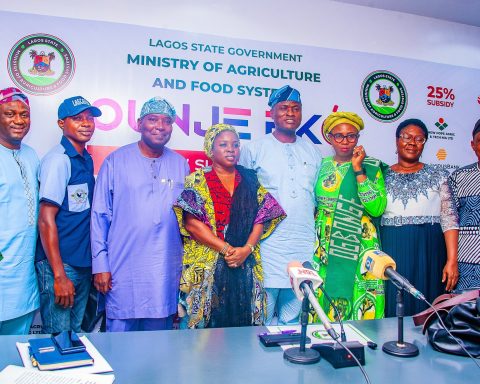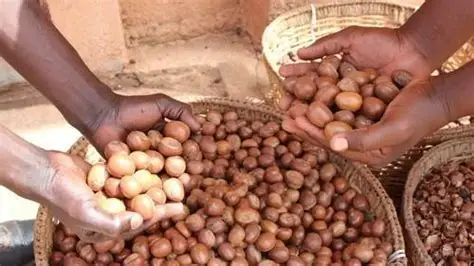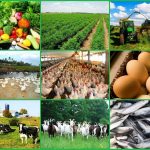The Federal Government has raised alarm over Nigeria’s heavy dependence on imported food, revealing that the country spends more than $10 billion annually on items such as wheat, rice, sugar, fish, and tomato paste.
Minister of Agriculture and Food Security, Senator Abubakar Kyari, disclosed on Tuesday in Lagos at the FirstBank 2025 Agric & Export Expo, stressing that the figure is unsustainable and threatens both economic stability and food security.
Join our WhatsApp ChannelKyari, represented by his Special Adviser, Ibrahim Alkali, said the current imbalance between imports and exports is hurting the economy.
“Nigeria spends over $10 billion annually importing food such as wheat, rice, sugar, fish, and even tomato paste. Agriculture already contributes 35 per cent of our GDP and employs 35 per cent of our workforce. We sit on 85 million hectares of arable land with a youth population of over 70 per cent under the age of 30. Yet Nigeria accounts for less than 0.5 per cent of global agro-exports. Currently, the nation earns less than $400 million from agro exports.”
READ ALSO:
- Jaiz Bank Grows Revenue By 25%, Records N7.62bn Profit In Three Months
- NBA Condemns Assault on Anambra Corps Member, Demands Prosecution of Culprits
- Over N1.33bn Wiped Off Stock Market As Dangote Cement, Jaiz Bank Record Losses
He argued that the solution lies in transforming how agriculture is financed, noting that existing credit systems “suffocate” rather than support farmers.
“To build a non-oil export economy, we must rethink how we finance agriculture. What Nigeria needs are instruments that align with the realities of farming mechanisms that reward performance, adjust to risk, and align investors with producers. Across the world, innovative financing has transformed agriculture from subsistence to surplus. Nigeria can do the same if we adopt models such as revenue-sharing finance, performance triggers, factoring, forward contracts, pay-as-you-harvest, and equity financing.”
The minister maintained that achieving food sovereignty is a priority for the Tinubu administration, insisting that Nigeria must feed itself “on its own terms, free from excessive dependency on imports.”
In his opening remarks, FirstBank Managing Director/CEO, Olusegun Alebiosu, described the Agric & Export Expo as a platform to reposition agriculture and non-oil exports as engines of growth.
“The renamed FirstBank Agric & Export Expo reflects our renewed and unwavering commitment to positioning non-oil exports as a transformative force in Nigeria’s economy. By fostering collaboration, driving innovation and making strategic investments, we can unlock the full potential of our agricultural value chain and open new pathways to shared prosperity.”
The expo, themed “The Fundamentals of Building an Export-Driven Economy,” brought together policymakers, financiers, and industry leaders, with a shared consensus that reducing Nigeria’s $10bn food import bill is critical to strengthening food security, stabilising the naira, and building a more resilient economy.
Amanze Chinonye is a Staff Correspondent at Prime Business Africa, a rising star in the literary world, weaving captivating stories that transport readers to the vibrant landscapes of Nigeria and the rest of Africa. With a unique voice that blends with the newspaper's tradition and style, Chinonye's writing is a masterful exploration of the human condition, delving into themes of identity, culture, and social justice. Through her words, Chinonye paints vivid portraits of everyday African life, from the bustling markets of Nigeria's Lagos to the quiet villages of South Africa's countryside . With a keen eye for detail and a deep understanding of the complexities of Nigerian society, Chinonye's writing is both a testament to the country's rich cultural heritage and a powerful call to action for a brighter future. As a writer, Chinonye is a true storyteller, using her dexterity to educate, inspire, and uplift readers around the world.
- Amanze Chinonye
- Amanze Chinonye
- Amanze Chinonye
- Amanze Chinonye
- Amanze Chinonye
- Amanze Chinonye
- Amanze Chinonye
- Amanze Chinonye
- Amanze Chinonye
- Amanze Chinonye
- Amanze Chinonye
- Amanze Chinonye
- Amanze Chinonye
- Amanze Chinonye
- Amanze Chinonye
- Amanze Chinonye
- Amanze Chinonye
- Amanze Chinonye
- Amanze Chinonye
- Amanze Chinonye
- Amanze Chinonye
- Amanze Chinonye
- Amanze Chinonye
- Amanze Chinonye
- Amanze Chinonye
- Amanze Chinonye
- Amanze Chinonye
- Amanze Chinonye
- Amanze Chinonye
- Amanze Chinonye
- Amanze Chinonye
- Amanze Chinonye
- Amanze Chinonye
- Amanze Chinonye
- Amanze Chinonye
- Amanze Chinonye
- Amanze Chinonye
- Amanze Chinonye
- Amanze Chinonye
- Amanze Chinonye
- Amanze Chinonye
- Amanze Chinonye
- Amanze Chinonye
- Amanze Chinonye
- Amanze Chinonye
- Amanze Chinonye
- Amanze Chinonye
- Amanze Chinonye
- Amanze Chinonye
- Amanze Chinonye
- Amanze Chinonye
- Amanze Chinonye
- Amanze Chinonye
- Amanze Chinonye
- Amanze Chinonye
- Amanze Chinonye
- Amanze Chinonye
- Amanze Chinonye
- Amanze Chinonye
- Amanze Chinonye
- Amanze Chinonye
- Amanze Chinonye
- Amanze Chinonye
- Amanze Chinonye
- Amanze Chinonye
- Amanze Chinonye
- Amanze Chinonye
- Amanze Chinonye
- Amanze Chinonye
- Amanze Chinonye
- Amanze Chinonye
- Amanze Chinonye
- Amanze Chinonye
- Amanze Chinonye
- Amanze Chinonye
- Amanze Chinonye
- Amanze Chinonye
- Amanze Chinonye
- Amanze Chinonye
- Amanze Chinonye
- Amanze Chinonye
- Amanze Chinonye
- Amanze Chinonye
- Amanze Chinonye
- Amanze Chinonye
- Amanze Chinonye
- Amanze Chinonye
- Amanze Chinonye
- Amanze Chinonye
- Amanze Chinonye
- Amanze Chinonye
- Amanze Chinonye
- Amanze Chinonye
- Amanze Chinonye
- Amanze Chinonye
- Amanze Chinonye
- Amanze Chinonye
- Amanze Chinonye
- Amanze Chinonye
- Amanze Chinonye
- Amanze Chinonye
- Amanze Chinonye
- Amanze Chinonye
- Amanze Chinonye
- Amanze Chinonye
- Amanze Chinonye
- Amanze Chinonye
- Amanze Chinonye
- Amanze Chinonye
- Amanze Chinonye
- Amanze Chinonye
- Amanze Chinonye
- Amanze Chinonye
- Amanze Chinonye
- Amanze Chinonye
- Amanze Chinonye
- Amanze Chinonye
- Amanze Chinonye
- Amanze Chinonye
- Amanze Chinonye
- Amanze Chinonye
- Amanze Chinonye
- Amanze Chinonye
- Amanze Chinonye
- Amanze Chinonye
- Amanze Chinonye
- Amanze Chinonye
- Amanze Chinonye
- Amanze Chinonye
- Amanze Chinonye













